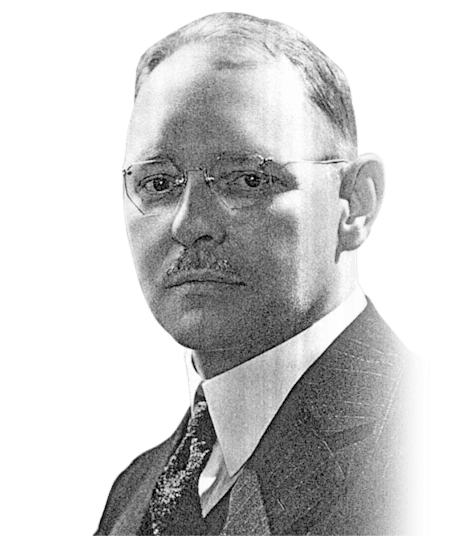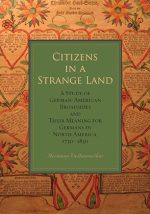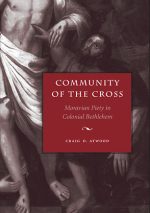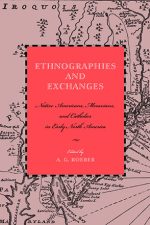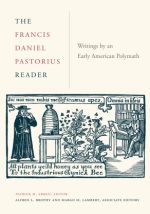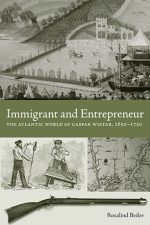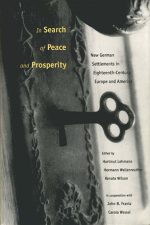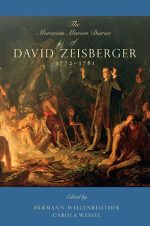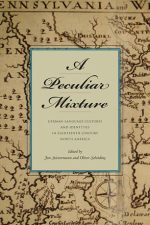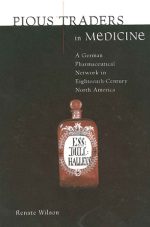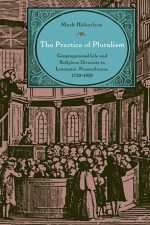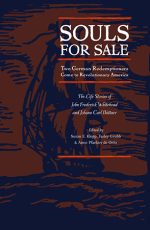Max Kade German-American Research Institute at Penn State
The Max Kade Institute promotes research into the role of German-speakers and cultures in the Americas and around the globe from the sixteenth century to the present.
We examine the history of German migrants, merchants, soldiers, artists, writers, and colonists as they moved across the Atlantic and through the world. The history and maintenance of German-speaking communities in the United States and across the New World are a particular interest for our students and scholars. The Max Kade Institute fosters academic exchange and dialogue between Penn State and universities in Germany by sponsoring visiting professors, international conferences, and study abroad. We are committed to fostering an understanding of German culture on the Penn State campus through our sponsorship of events. At the same time, the Institute fosters research and publication that examines how Germans fostered and participated in global networks.
Our goals:
- Building partnerships with colleagues in many different departments
- Fostering research on German-American relations from 1600 to the present
- Sponsoring publications on Germans migrating to the Americas and the rest of the world
- Organizing campus events to deepen understanding of German culture in a global context
- Funding undergraduate, graduate, and post-doctoral research in German-American topics
Book Series: Germans Beyond Europe
“This fine volume is a highly welcome addition to the literature on translation and intercultural communication in the multiethnic environment of eighteenth-century Pennsylvania. Babel of the Atlantic combines the perspectives of history, literary studies, and material culture; it brings together experts on Pennsylvania German history and culture, ethnohistory, and the history of abolitionism; and it is sensitive to issues of gender.”
-Mark Häberlein
“Concentrating on texts other than the classics of the canon allows for fresh perspectives. If ‘all politics is local,’ so, too, seems culture. Includes impressive bibliography, documentation, and index. Recommended.”
-J. M. Jeep, Choice
“Through his analysis of these prints, Wellenreuther provides new insights into the social, political, and religious history of the largest non-Anglophone minority in colonial, revolutionary, and young republican America. As a bonus to its scholarly value, the book is also an enjoyable read.”
-Gerald Theodore Macdonald, Journal of Moravian History
“This excellent religious history supplements earlier books that focus on the social history of early Bethlehem. A necessary purchase for collections emphasizing Colonial America, American religious history, and communitarian experiments, it will also interest those studying women and religion.”
-J. W. Frost, Choice
“The anthology succeeds in recovering Native as well as missionary voices, carefully building context to make those voices understandable to contemporary readers and reintroducing these important texts in exciting ways that will stimulate further study.”
-R. A. Bucko, Choice
“Francis Daniel Pastorius led an amazing life. As lawyer and public official, scholar and writer, poet and teacher, he did much to shape the world of colonial Pennsylvania. This excellent reader offers a vivid and comprehensive introduction to his work, his world, and his writings—from his massive commonplace books to his poems and letters.”
-Anthony T. Grafton, author of Bring Out Your Dead: The Past as Revelation
“Immigrant and Entrepreneur is a welcome addition to colonial and Atlantic history. It is impressively researched and provides an intriguing account of the process by which Caspar Wüstar, a forester from the Palatinate, became Caspar Wistar, one of Pennsylvania’s wealthiest merchants and manufacturers.”
-Daniel B. Thorp, Journal of American History
“The fourteen essays in this collection offer a fresh perspective not only on the history of the eighteenth-century patterns of German migration, but also on the larger question of migration patterns in the early modern Atlantic world. . . . This edited volume provides a splendid example of the potential insights to be gained from considering the history of German migration in comparative context. . . . Considered together, these essays represent an important and innovative contribution to early American scholarship.”
-Jon Parmenter, Canadian Journal of History
“David Zeisberger’s diaries are a rich source for Native American and Moravian history. The 1772–1781 diaries remain largely untapped by American scholars because they have not been available in English translation. Publication of this modern scholarly edition, therefore, will have a major impact on the field of early American history.”
-Daniel K. Richter, University of Pennsylvania
“The essays in this book make a strong case for understanding the immigrant experiences of the Germans who came to America in the eighteenth century through the lens of cultural history, abetted by material culture, the history of the book, and close literary analysis. This is a deeply informative book and one that deserves broad attention.”
-David D. Hall, Harvard Divinity School
“A fundamental contribution to the discussion of the ‘medical marketplace.’ Wilson demonstrates the intimate associations between religious and medical Pietism and their commercial underpinnings in ways previously hardly imagined. Her careful and painstaking archival investigations are presented clearly and vigorously. This is a path-breaking work of impeccable scholarship, innovative and well written.”
-Harold J. Cook, University of Wisconsin, Madison Medical School
“Thorough and persuasive. The people of Lancaster come across as devoted and essentially conservative, supporting their churches and attached to their ways of worship, even if individuals among them occasionally changed their minds. Häberlein persuasively shows that the laity provided the true continuity of the church.”
-Ned Landsmann, Stony Brook University
“This volume will not only serve scholars of early American history and culture as key source material in the interpretation of the immigrant experience, but it should become assigned reading for American history or literature courses from the survey course up.”
-Patrick M. Erben, Eighteenth-Century Intelligencer
Funding Opportunities

The Max Kade Research Institute offers two types of research funding directly related to graduate studies and non-tenure track faculty at Penn State:
- The Max Kade Fellowship provides a year of funding for outstanding doctoral students in the College of the Liberal Arts working on a dissertation in a German field of research. The Max Kade Fellowship is intended to help one student finish their dissertation during the fellowship year by providing a release from teaching and other obligations connected to a graduate assistantship. The fellowship covers the academic year 2020-2021. To qualify, students must:
- Have demonstrated excellence in teaching;
- Have shown their fluency in academic German;
- Have an established record of courses and research in a German field;
- Must be at an advanced stage of completing their dissertations. Students must have already applied for support from RGSO and have completed their Liberal Arts dissertation release
To apply, students must submit the following:
1. CV
2. Unofficial Transcript
3. A proposal for the fellowship year that includes a one-page abstract of the dissertation, an outline of the progress made to date on the dissertation, and a time table for finishing the dissertation.
4. A writing sample demonstrating progress on the dissertation (no more than 25 pages)
5. A letter of support from the dissertation advisor.Students will not be required to remain in residence. Students should send their application as a pdf attachment to Daniel Purdy, dlp14@psu.edu by March 27, 2020.
- Penn State Max Kade German-American Research Institute invites applications for its summer travel award. The award provides funds for two types of travel research: Penn State teaching faculty without tenure and graduate students. The Max Kade Research and Travel Award provides funds to support work in German-language archives, libraries, or other global research sites related to German language communities. The award may also be used to defray the costs of German language courses in Germany.
The project description should clearly state how the Max Kade Travel Award will enhance the applicant’s research. Funds may be used for travel, housing, duplication of research materials, book/media purchases. Applications must be submitted by March 20, 2020 to Professor Daniel Purdy, dlp14@psu.edu. Complete applications must include a current curriculum vita, a two-page project statement, and a budget.
Bauhaus Transfer: An International Symposium
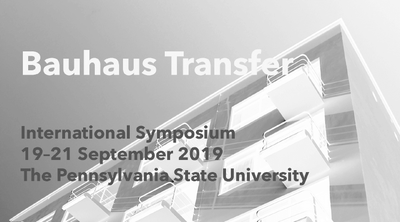
ROSALIND BEILER
The Pennsylvania State University
Celebrating the 100th anniversary of the most important school for Modernist design, the Max Kade Institute will hold an international conference to explore the influences of Bauhaus ideas, theories, concepts, and principles…
Visiting Scholar
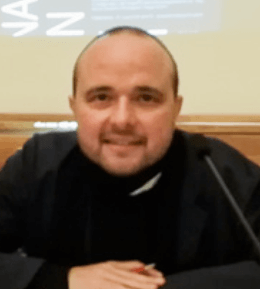
Dr. Johannes Schülein (Spring 2018) serves as a research associate in philosophy at the University of Bochum and the book review editor for the journal, Hegel-Studien. His first book on the critique of metaphysics in Hegel and Derrida appeared in 2016 with Meiners Verlag. In addition to his research on Hegel, Dr. Schülein has written on metaphysics in German Romanticism, Schelling and Spinoza. As the Max Kade Visiting Professor, Dr. Schülein, lectured on “The Logic of Difference: Reconsidering Derrida’s Critique of Hegel” while contributing also to a Philosophy Department workshop on Schelling’s later philosophy (after the so-called Freedom Essay of 1809.)
German Day
Max Kade is proud to support German Day, when high school students learning German visit the University Park campus to compete in contests and games as they show off their German language skills.
Who was Max Kade?
Max Kade was one of those immigrants for whom the American dream became reality. Having made a fortune in the pharmaceutical industry, he endowed the Max Kade foundation with the goal of promoting the mutual understanding of the people and cultures of Germany and the United States.
